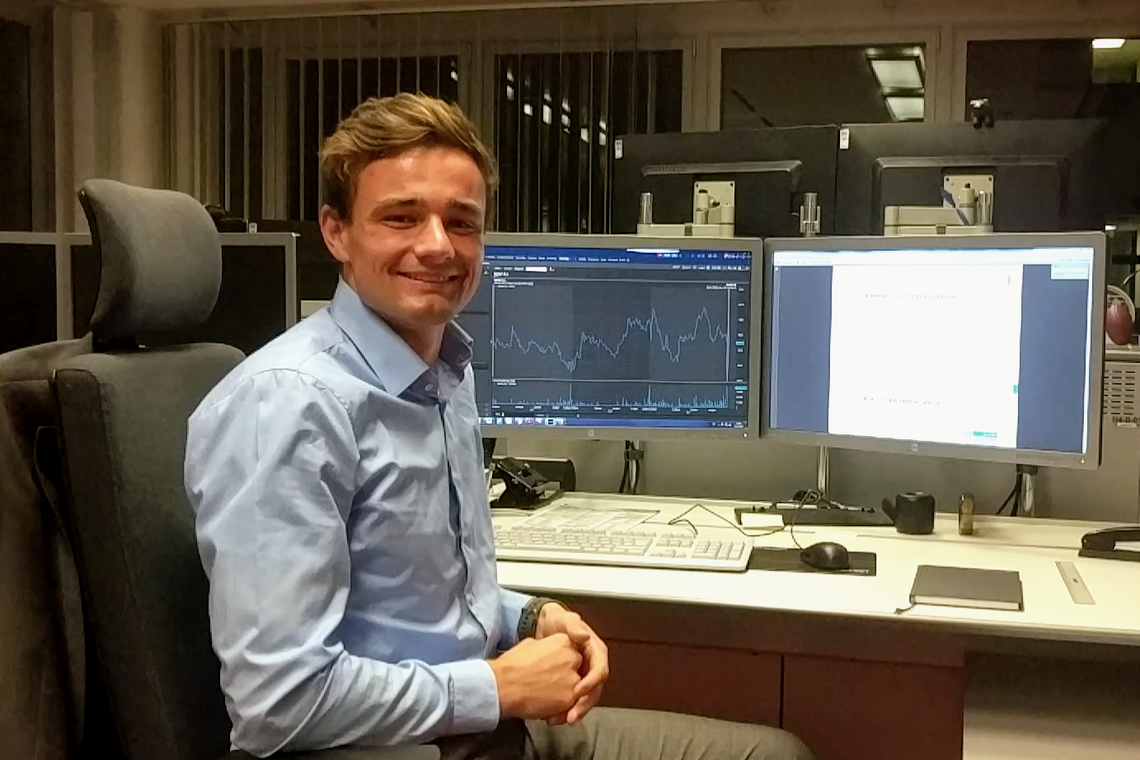Two degrees for a career
'Two birds with one stone'- that's what Ole Peters, a business student, thought and took part in the double degree programme with the University of Rhode Island. He returned to Hamburg at the end of May with a special honour.
Right from the start of his studies at HAW Hamburg, Ole's plan was to go to the USA, specifically as part of the double degree programme. "I saw it as an opportunity to set myself apart from the many other business administration students. And the programme with URI allowed me to study abroad for longer than just a single semester."
With an internationally orientated degree, students are well prepared for a career in today's global workplace; with two degrees, they are even more flexible and mobile. With its double degree programme with URI, HAW Hamburg enables selects excellent students from its Bachelor's degree programme in International Business to spend a year studying in the USA. They complete courses at the URI College of Business Administration without having to pay tuition fees. Upon successful completion of the two semesters, they are awarded the URI Bachelor's degree in Global Business along with their HAW Hamburg Bachelor's degree.
Business topics in practice
As part of the double degree programme, HAW Hamburg students must complete a curriculum of prescribed business modules and electives (so-called ‘General Education’ (GE) courses) at URI. In the first semester, Ole completed Business Law, Global Supply Chain Management, Business in Society, Natural Resource Conservation (GE) and Introduction to English Literature (GE); in the second semester, Strategic Management, Intermediate Accounting, Security Analysis, International Dimensions (GE) and Introduction to Design (GE).
It was another new experience for me because we don't have a comparable course in Hamburg and I was able to learn a lot from the simulation.
The business courses at URI are in the higher semesters and are designed to build on the degree programme in Hamburg as well as provide new insights. Practical experience in the lectures plays a major role, just like in Hamburg. As part of ‘Business in Society’, Ole's favourite subject, the students had to follow the latest business news in the Wall Street Journal and then discuss it weekly in the seminar. 'This allowed me to test many of the concepts I had learnt so far against current developments. I've also learnt to take a much more critical view of things.' In the ‘Security Analysis’ course, students familiarised themselves with the Bloomberg Terminal, a computer software system for the financial services sector, and were able to apply their newly acquired knowledge in a very practical way. Teamwork was particularly emphasised in the ‘Strategic Management’ course. Together with other URI students, Ole ran his own company for several years as part of a business simulation and in competition with the other teams. 'It was another new experience for me because we don't have a comparable course in Hamburg and I was able to learn a lot from the simulation.’
The General Education courses, on the other hand, are completely atypical for a German degree programme, but for Ole they were also an enrichment. "I like the idea of taking courses that at first glance don't seem to be relevant to my future career in any economic field. Even though in my case they had more of an ‘upper secondary school character’, I saw these courses as an opportunity to broaden my perspective. They have given me new food for thought."
A different world of studying and great support
After four semesters at HAW Hamburg, it is normal to travel to the USA with certain expectations and ideas. ‘I think I imagined it would be easier and harder at the same time,’ summarises Ole. 'Easier in terms of the workload, which was greater than expected; harder in terms of the learning content. After four semesters at HAW Hamburg, I had already heard of many concepts and terms, so many courses were relatively easy for me.' And the support from the URI professors was certainly also helpful, which Ole experienced as very positive: ‘The professors were extremely interested in ensuring that their students were successful and were always available and provided support wherever they could.’
Overall, studying at an American university is different to studying at a German university. Students are regularly assessed through mid-term exams, homework, presentations and ‘extra credit’ events, among other things, so that the final grades for the courses are made up of many small parts that accumulate over the semester. That sounds like a lot of work. ‘Yes, that's true,’ confirms Ole, 'but I can also reassure anyone who is thinking of doing a year abroad in the USA. Once you're there, you adapt to the new environment and the new requirements very quickly, almost by yourself.'
An excellent year
As already mentioned at the beginning, the double degree programme with URI is a small programme for excellent students at HAW Hamburg. As they are selected through an elaborate application process, it is no surprise when our students return to Hamburg with excellent grades. Ole is no exception. However, he was honoured twice in particular. Not only did he make it onto the Dean's List (a special award for all students with a grade point average of at least 3.3 out of 4.0) with all ‘A’s, but he was also among the top ten per cent of URI Business students. For this, he was offered membership by several honour societies. He decided to join Beta Gamma Sigma.
And what happens now? 'Right now I'm doing my mandatory internship in investment banking in Frankfurt, and then I'm writing my bachelor's thesis. I haven't decided what I want to do after my bachelor's degree yet, but I could well imagine returning to the USA - either to do a master's degree or to work. It will definitely be much easier with an American Bachelor's degree.'
Iw/June 2019

